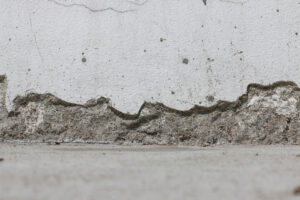How to Protect a Foundation From Water Damage

Do you want to know how to protect foundation from water? First, you must drain excess water from your property at all costs.
Good drainage involves adding a sump pump, nurturing your garden, and fixing your gutters. In other cases, you may need to seal your basement with an appropriate sealant.
Since standing water pools can damage your foundation exponentially, your property needs proper drainage to get rid of the excess water. Water pools can soften the soil around your foundation and cause sinking.
You can use various water-channeling methods to divert water from your property. To see if you have proper drainage, check your yard for water pools.
Also, check your foundation routinely for signs of cracks or mold. That said, a professional can spot warning signs on a deep level.
This article will show you how to protect your home foundation from water. Read on to know more.
Check Your Gutters
If you see excess water, this could be a sign of gutter troubles. Perhaps you have a clog in your gutter.
To check for gutter clogs, pour water down the spout. You’ll notice a clog when no water exits the other end. You can use a hose to push out the obstruction within the gutter.
In other cases, the gutters could be disconnected. Use a ladder to see if the gutters are connected accordingly.
- Note: When using a ladder, have a friend or family member hold onto the ladder firmly to maintain stability.
Moreover, check the condition of the gutters. You may have a leak and not know it. If you spot holes, apply a sealant to fix the problem. In other cases, the end caps may have undergone damage.
Sound Landscaping
Your garden may be the cause of improper drainage. Bad soil is one of the main causes of poor drainage. Apply new soil with quality organic material so the ground can absorb the water.
Quality soil also allows plants to absorb more water in the process. You can also control the soil by gardening within raised beds. Garden soil in raised beds will drain better.
Other ways to foster water drainage within gardens include:
- Digging ground channels: Use a shovel or trowel to create a water path that drains away from the garden. Dig the channel so the water can run down your driveway.
- Adding gravel paths: This option entails digging a deeper water channel and laying down gravel. The gravel will encourage water flow.
- Applying drainage pipes: If you don’t want to dig a channel, you can use buried or aboveground plastic pipes to divert water away from your yard.
You can also hire a landscaper to create a suitable drainage plan.
Apply Sealants in the Basement
Applying sealants within the basement is a viable short-term solution and will keep moisture at bay. A sealant can also prevent mold growth. You can use a waterproof coating, and these coatings are inexpensive.
That said, you’ll save additional time by hiring a professional waterproofing company. A trained expert knows the best areas that need sealant. Plus, a trained eye will spot areas of concern and will provide further guidance on the proper solution.
Use a Sump Pump
A sump pump is an underground device that pumps out the water and prevents flooding within crawlspaces and basements. The machine is on standby and absorbs water.
In the event of a heavy thunderstorm, for example, the additional water will divert to the pump. As the pump pit fills with water, the machine will activate.
Besides mold and flooding prevention, a sump carries the following benefits:
- Keeps insects and termites at bay
- Promotes indoor air quality
- Protects wall paint and other coverings
- Ensures the basement remains dry
- Protects basement appliances from corrosion
Above all, it will safeguard your foundation by preventing unwanted water from seeping in. Consider a sump pump if you live in an area prone to flooding. For instance, a sump pump is vital if you live in rainy or snowy regions.
Sump pumps are useful for finished basements as well. Overall, talk to a professional to see if a sump is the best choice for your basement or crawl space.
Contact a Professional
If you notice signs of foundation wear, the best way to protect your foundation from water is to contact a foundation expert. They can recommend the best repair strategies and provide tips on house foundation protection.
If you have mold, for example, a waterproofing company can also implement mold remediation services. They may also recommend the use of a dehumidifier to mitigate moisture and mold.
Another way to protect your foundation is through an annual maintenance plan. A trained expert will inspect your crawl space or basement for signs of damage.
An annual plan will help you spot problems early and spare you the hassle of pricey repairs. An inspection plan will also help you maintain air quality.
How to Protect Foundation From Water the Right Way
If you want to know how to protect foundation from water, check the gutters, improve your garden, seal the basement, or use a sump pump.
Repairing gutters and tending your garden will reduce the amount of moisture and water on your property. Sealing the basement and installing a sump pump will divert water from your home.
More importantly, involve a professional who can recommend the best course of action.
Want to know more about water leakage in your home? Click here to learn more.
Recent Posts
- How Crawl Space Encapsulation Benefits the Environment – An Expert Guide
- 6 Ways Professionals Keep Your Crawl Space in Top Shape
- Structural Repair Solutions for Crawl Spaces, Basements, and Foundations
- Essential Crawl Space Repair Tips Every Homeowner Should Know
- The Importance of Radon Mitigation: Ensuring a Safe Living Environment for Homeowners
Categories
- Basement Mold
- Basement Waterproof Foundation
- Basement Waterproofing
- Crawl Space Dehumidifier
- Crawl Space Encapsulation Cost
- Crawl Space Repair
- Crawl Space Waterproofing
- Encapsulation
- Foundation Repair
- Foundation Waterproofing
- French Drains
- Leaky Basement
- Mold Remediation
- Mold Removal
- Radon
- Slab Jacking
- Sump Pump
- Uncategorized
- Vapor Barrier
- Water Leak
- Waterproofing
- White Mold
Archives
- June 2024
- May 2024
- March 2024
- January 2024
- June 2023
- May 2023
- April 2023
- March 2023
- February 2023
- January 2023
- December 2022
- November 2022
- October 2022
- September 2022
- August 2022
- July 2022
- June 2022
- May 2022
- March 2022
- February 2022
- January 2022
- December 2021
- November 2021
- October 2021
- September 2021
- August 2021
- July 2021
- June 2021
- May 2021
- April 2021
- March 2021
- February 2021
- January 2021
- December 2020
- November 2020
- October 2020
- September 2020
- August 2020
- July 2020
- June 2020
- May 2020
- April 2020
- March 2020
- February 2020
- January 2020
- December 2019
- November 2019
- October 2019
- September 2019
- August 2019
- July 2019
- June 2019
- May 2019

